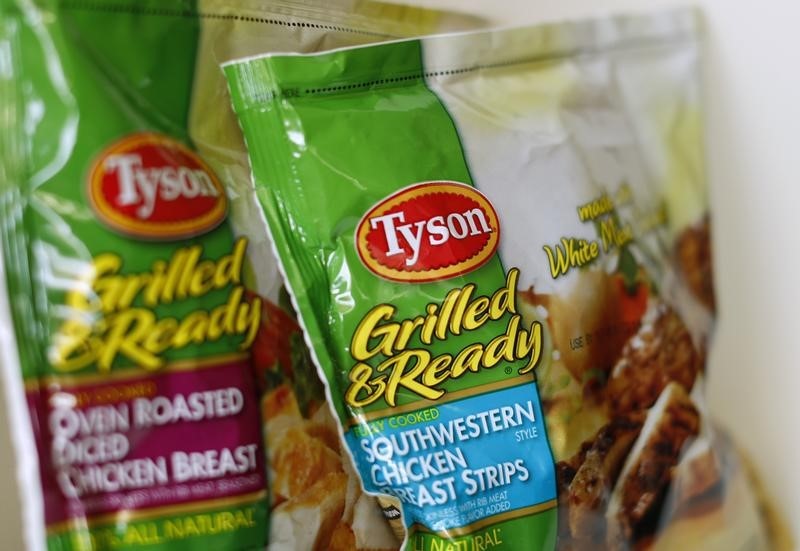By P.J. Huffstutter
CHICAGO (Reuters) - Tyson Foods Inc (N:TSN), the largest U.S. poultry producer, plans to eliminate use of human antibiotics in its chicken flocks by September 2017, one of the most aggressive timetables yet set by an American poultry company.
The Arkansas-based chicken and meat company also said Tuesday it is working on ways to curtail such on-farm drug practices at its other protein businesses, which include pork and beef.
The move marks the latest push by the livestock and food industries to reduce the use of antibiotics crucial to human health in meat production.
Public health experts and federal regulators are concerned that routine feeding of antibiotics to animals could spur creation of antibiotic-resistant superbugs in humans, creating a health hazard.
Tyson's move will help the company meet a deadline recently outlined by McDonald's Corp (N:MCD) for its U.S. restaurants to gradually stop buying chicken raised with human antibiotics over the next two years.
But Tyson's timetable was not synchronized with that of McDonald's, to which Tyson is a leading chicken supplier, Chief Executive Donnie Smith said on a conference call Tuesday.
The shift away from human antibiotics in its poultry business is not expected to change Tyson's costs, the company said, and is part of an ongoing effort that goes beyond McDonald's.
ANTIBIOTIC USE IN CATTLE, HOGS
The news was praised by public health and consumer advocacy groups, which note that the nation's top three chicken producers have all made commitments to end routine antibiotic use. The pressure now, critics say, will be for meat companies to carry those changes over to their beef and hog units.
Smith said Tuesday that Tyson does not know what volume of medically important antibiotics are being used on-farm for the company's other meat businesses, because it does not own all the livestock or control the production or feed supply.
Tyson controls its chicken supply chain from beginning to end, from owning the birds to supplying the medicated feed to the contract farmers that raise the broilers for them. But it buys hogs, cattle and turkeys from independent farmers.
"We don't know because we don't own those animals," Smith said.
To gain clarity, Tyson is forming working groups with independent farmers, company suppliers, veterinarians and others to talk about how antibiotics are used on the farm and to develop ideas to cut the use of drugs vital to fighting human infections in its U.S. beef, pork and turkey supply chains.
The working groups will begin meeting this summer. Tyson has not set a time frame or reduction goals for decreasing human antibiotic use in its other protein businesses, company officials said.
"It's the same challenge that McDonald's faced with its chicken business," said Steven Roach, senior analyst at advocacy group Keep Antibiotics Working. "While Tyson may not control that supply chain right now, they can, like McDonald's, make demands on their suppliers to do things differently."
While veterinary use of antibiotics is legal, controversy has grown over the routine feeding of antibiotics that are important to humans to otherwise healthy chicken, cattle and pigs in a bid to stave off disease and help the animals grow more quickly.
Tyson said it has already stopped using all antibiotics in its 35 broiler hatcheries and has cut human antibiotics used to treat its broiler chickens by more than 80 percent since 2011. The company said it requires a veterinary prescription when antibiotics are used on its broiler farms.
INDUSTRY SHIFTS
Earlier this month, the Wall Street Journal reported that Pilgrim's Pride Corp (O:PPC), the nation's second-largest poultry processor, would cut all antibiotics from a quarter of its chicken production by 2019.
Rival poultry processor Perdue Farms Inc told Reuters more than 95 percent of the chickens it produces are raised without antibiotics approved for human use, and more than half are raised with no antibiotics of any kind.
In 2014, Sandwich chain Chick-fil-A gave its producers five years to meet its commitment to go antibiotic-free for chicken. Perdue is a major supplier to Chick-fil-A.
Tyson has been working with livestock drug companies and others to test a variety of alternatives to antibiotics to protect birds, ranging from probiotics to essential oils derived from plant extracts, the company said.
